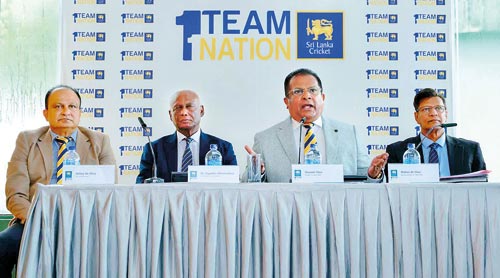SLC belongs to the people of country — Keerthinanda

Flanked by Ex-Co members, SLC President Shammi Silva tries tovalidate SLC’s spending during the T20 World Cup in Australia
While it is obvious to those acquainted with the Sports Law that Sri Lanka Cricket (SLC) or, for that matter, any registered national sports body, is bound by the legislation, the thinking in some quarters is contradictory.
A month ago, at a packed press conference during the second Test between Sri Lanka and Pakistan at the SSC grounds, SLC President Shammi Silva claimed the institution that he heads was a private one and that its funds belong only to the membership.
Silva said this to validate SLC’s spending during the T20 World Cup in Australia which is under scrutiny following a draft audit was leaked to the media.
“This is not government money. This is the money that ICC gives us. We are going to Parliamentary Oversight Committee on Public Enterprises (COPE) because the government auditor audits our accounts. Everyone think that this is public money but it’s not. It belongs to the membership,” he countered, responding to allegations that SLC misuses public funds for their personal benefits.
This ill-conceived comment drew widespread criticism with many arguing that, although SLC’s independence in governance is respected, it’s a statutory body established by an Act of Parliament.
A few months after enactment of Sports Law No.25 of 1973, the then Sports Minister gazetted its first regulations (in 1974), introducing a process of registration for sports bodies.
SLC, earlier known as the Board of Control for Cricket in Sri Lanka, was registered under the Sports Law and functions under the Department of Sports Development of the Ministry of Sports.
Further, the Secretary to the Ministry of Sports, as the Chief Accounting Officer, is responsible for submitting the annual reports of these sports associations to Parliament.
By the Act No.47 of 1993, the first amendment the Sports Law Act No.25 of 1973, it is mandatory for all registered sports associations to get their annual accounts audited by the Auditor General and their workings and functions are subject to scrutiny by the Committee on Public Enterprises.
“So the notion that Sri Lanka Cricket or any other registered sports body is a private entity is misleading,” said Panduka Keerthinanda, attorney-at-law.
“Sri Lanka Cricket is registered since 1974 and no one can say it’s a private entity. It belongs to the people of this country. They must comply with all applicable laws, including laws on corruption and financial management.”
If it is a private company, it should register under the Companies Act No.7 of 2007 and the SLC constitution clearly recognises the Sports Law as supreme in the event of its constitution being in conflict with the Sports Law and the regulations gazetted thereafter.
“Not only the Sport Law, they have adopted the Convention against Doping Act No.33 of 2013 and the Prevention of Offences Related to the Sports Act No.24 of 2019. In addition, they are governed by the Anti-Corruption Act No.9 of 2023, passed in Parliament recently,” Keerthinanda said.
Keerthinanda was instrumental drafting both doping and anti-corruption act–the first South Asian country introduce tough anti-corruption laws to tackle sports related corruptions.


